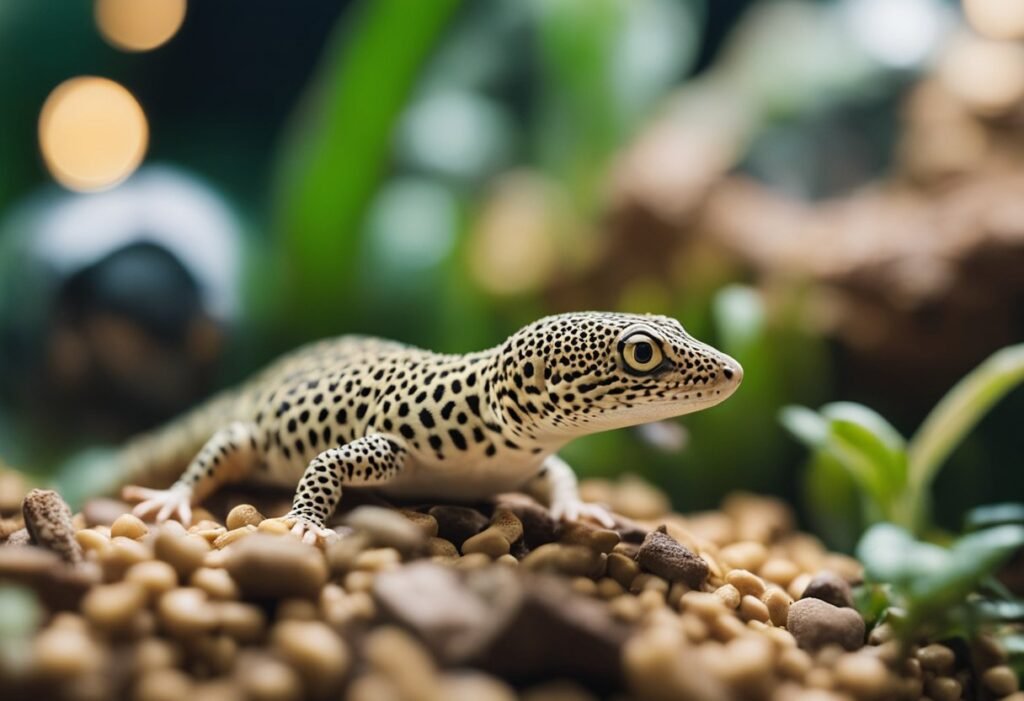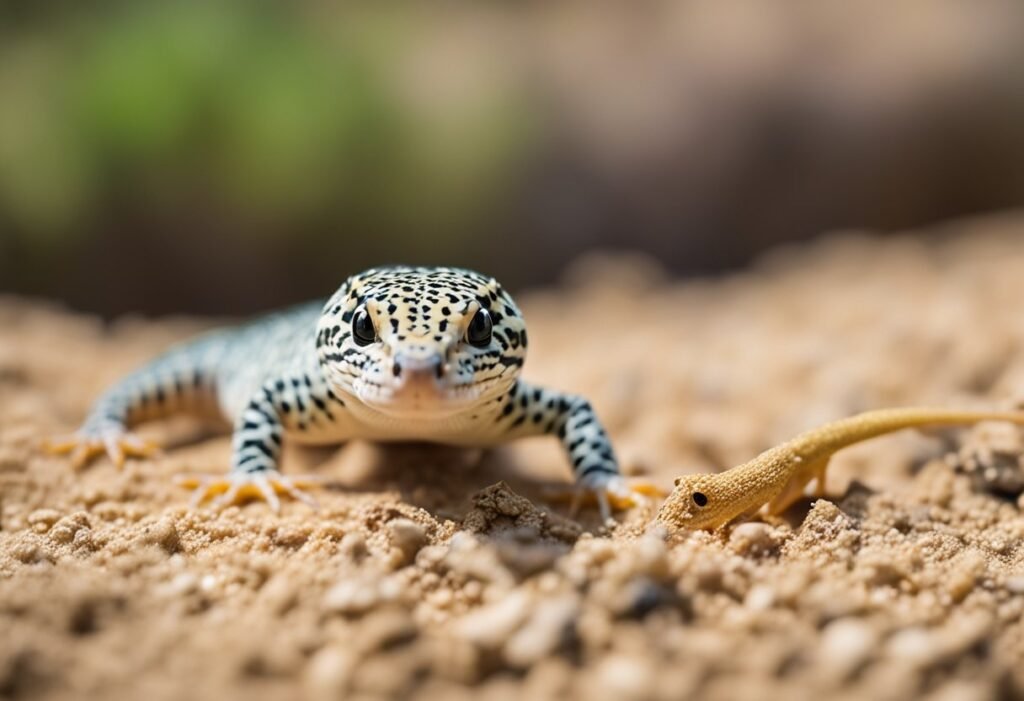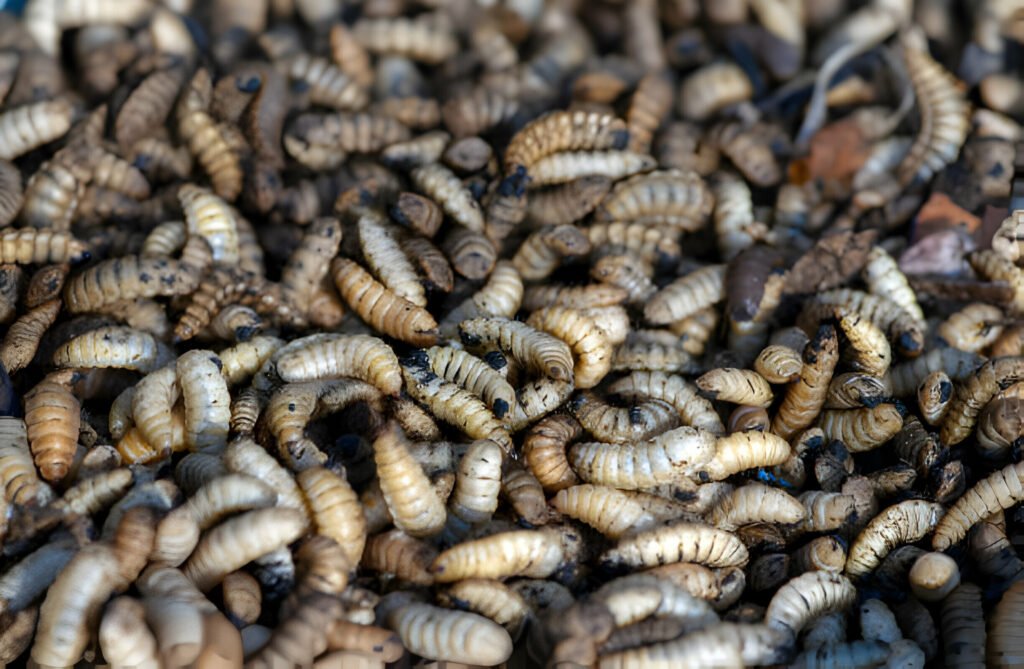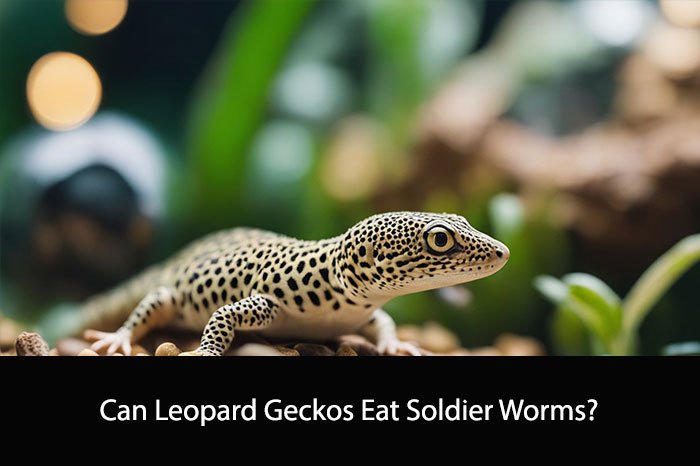Leopard geckos are popular pets that are known for their unique appearance and docile nature. As with any pet, it’s important to ensure they are receiving a balanced and nutritious diet. One common question that arises is whether leopard geckos can eat soldier worms.

Soldier worms, also known as black soldier flies, are a popular feeder insect for many reptiles. They are high in protein and low in fat, making them a nutritious option for leopard geckos. However, it’s important to consider the size and age of your gecko before feeding them soldier worms.
When it comes to feeding leopard geckos, it’s important to research and understand the nutritional needs of your pet. In this article, we will explore whether leopard geckos can eat soldier worms and provide guidance on how to incorporate them into your gecko’s diet.
Dietary Needs of Leopard Geckos

As owners of leopard geckos, we need to ensure that they receive a balanced and nutritious diet to maintain their health and wellbeing. Leopard geckos are insectivores, which means they primarily consume insects. Therefore, it’s crucial to provide them with a variety of insects to meet their dietary needs.
Leopard geckos require a diet that is high in protein and low in fat. They also need calcium and other essential vitamins and minerals to maintain strong bones and overall health. It’s essential to provide them with feeder insects that are gut-loaded with nutritious food and dusted with calcium and vitamin supplements.
Some of the best feeder insects for leopard geckos include crickets, mealworms, waxworms, and superworms. Soldier worms, also known as black soldier fly larvae, are an excellent source of protein and calcium for leopard geckos. They are low in fat and high in calcium, making them a healthy addition to their diet.
It’s important to note that leopard geckos should not be fed wild-caught insects, as they may contain harmful pesticides or parasites. Additionally, avoid feeding them insects that are too large or difficult for them to digest.
In summary, providing a balanced and nutritious diet for leopard geckos is crucial for their health and wellbeing. Feeder insects like soldier worms can be a healthy addition to their diet, but it’s essential to ensure that they receive a variety of insects and supplements to meet their dietary needs.
What Are Soldier Worms?

Soldier worms, also known as black soldier fly larvae, are the larvae of the black soldier fly (Hermetia illucens). These worms are commonly used as a source of protein for livestock feed, and are becoming increasingly popular as a nutritious food source for reptiles, including leopard geckos.
Soldier worms are typically dark brown or black in color, and have a soft, squishy texture. They are high in protein, calcium, and other essential nutrients, making them an excellent addition to a leopard gecko’s diet.
Nutritional Profile of Soldier Worms
One of the main reasons why soldier worms are such a popular food source for leopard geckos is their impressive nutritional profile. Here is a breakdown of the key nutrients found in soldier worms:
- Protein: Soldier worms are extremely high in protein, with a protein content of around 40-50%. This makes them an excellent source of protein for leopard geckos, who require a diet high in protein to maintain their health.
- Calcium: Soldier worms are also a good source of calcium, which is essential for maintaining strong bones and teeth in leopard geckos.
- Fat: Soldier worms are relatively low in fat, with a fat content of around 20-25%. This makes them a good choice for leopard geckos who require a low-fat diet.
- Other nutrients: Soldier worms also contain a range of other essential nutrients, including phosphorus, magnesium, and potassium.
Overall, soldier worms are a highly nutritious food source that can provide a range of essential nutrients for leopard geckos. However, as with any new food source, it is important to introduce them gradually and monitor your gecko’s response to ensure they are tolerating them well.
Benefits of Soldier Worms in a Leopard Gecko’s Diet
Including soldier worms in a leopard gecko’s diet can provide several benefits for their health and wellbeing. These worms are high in protein, making them a great source of nutrition for your leopard gecko.
Soldier worms are also rich in calcium, which is essential for maintaining strong bones and teeth in leopard geckos. They also contain other important minerals such as iron, magnesium, and potassium.
In addition to being a nutritious food source, soldier worms can also help with digestion. They contain enzymes that aid in the breakdown of food, which can help prevent digestive issues such as constipation.
Leopard geckos are known to enjoy the taste of soldier worms, making them a great addition to their diet. However, it is important to ensure that soldier worms are not the only food source provided, as a varied diet is crucial for their overall health.
Overall, including soldier worms in a leopard gecko’s diet can provide several benefits for their health and wellbeing. They are a nutritious food source that can help with digestion and provide essential minerals such as calcium.
How to Feed Soldier Worms to Leopard Geckos
Soldier worms, also known as black soldier fly larvae, are a nutritious and protein-rich food source for leopard geckos. Here’s how to feed soldier worms to your leopard gecko.
Preparing Soldier Worms
Before feeding soldier worms to your leopard gecko, it’s important to properly prepare them. First, make sure the worms are gut-loaded, which means they have been fed a nutritious diet prior to being offered to your gecko. This can be done by feeding the worms a variety of fruits and vegetables, such as carrots, kale, and apples.
Next, dust the soldier worms with a calcium supplement powder before feeding them to your leopard gecko. This will help ensure your gecko is getting enough calcium in their diet, which is important for maintaining healthy bones.
Feeding Frequency and Portion Size
Leopard geckos can be fed soldier worms as a treat or as a regular part of their diet. However, it’s important to feed them in moderation and not as the sole source of food. We recommend feeding soldier worms to your leopard gecko once or twice a week, along with other food sources such as crickets and mealworms.
The portion size of soldier worms should be based on the size and age of your leopard gecko. As a general rule of thumb, feed your gecko as many soldier worms as they can eat in 10-15 minutes. Avoid overfeeding, as this can lead to obesity and other health problems.
In summary, soldier worms can be a great addition to your leopard gecko’s diet when fed in moderation and prepared properly. Remember to gut-load and dust the worms with calcium supplement powder before feeding, and adjust portion sizes based on your gecko’s size and age.
Potential Risks and Considerations
When considering feeding leopard geckos soldier worms, there are several potential risks and considerations to keep in mind. While soldier worms can be a nutritious addition to a leopard gecko’s diet, it is important to be aware of the potential hazards that they may pose.
Choking Hazards
Soldier worms are relatively large insects, and as such, they may pose a choking hazard to leopard geckos, particularly if they are not properly prepared. It is important to ensure that the worms are appropriately sized for the gecko, and that they are not fed in excessive quantities. In addition, it is recommended that the worms be gut-loaded and dusted with calcium and other essential nutrients prior to feeding, in order to ensure that they are as nutritious as possible.
Nutritional Imbalances
While soldier worms can be a good source of protein and other essential nutrients, they may also contribute to nutritional imbalances if they are fed exclusively or in excessive quantities. As with any food item, it is important to ensure that the gecko’s diet is varied and well-balanced, and that soldier worms are not the sole source of nutrition.
Pesticide Contamination
Finally, it is important to consider the potential for pesticide contamination when feeding leopard geckos soldier worms. These insects are often raised as bait or feed for other animals, and may be exposed to pesticides or other harmful chemicals in the process. It is important to source soldier worms from a reputable supplier, and to ensure that they have not been treated with any harmful substances prior to feeding them to your gecko.
In summary, soldier worms can be a nutritious addition to a leopard gecko’s diet, but it is important to be aware of the potential risks and considerations. By taking the necessary precautions and ensuring that the worms are properly prepared and sourced, you can help to ensure that your gecko remains healthy and happy.
Alternatives to Soldier Worms for Leopard Geckos
As leopard geckos are insectivores, they require a diet consisting of insects and worms. While soldier worms are a popular choice, there are several alternatives that can provide the same nutritional value.
Crickets
Crickets are a common staple for leopard geckos. They are high in protein and calcium, making them a great choice for a balanced diet. They are also readily available at most pet stores and online retailers.
Mealworms
Mealworms are another popular option for leopard geckos. They are easy to find and are also high in protein. However, they are lower in calcium than other options, so it’s important to supplement with calcium powder.
Dubia Roaches
Dubia roaches are a great alternative to soldier worms. They are high in protein and calcium, and are also low in fat. They are also easy to digest, making them a good choice for geckos with digestive issues.
Superworms
Superworms are larger than mealworms and soldier worms, making them a good choice for larger leopard geckos. They are high in protein and fat, so they should be fed in moderation. It’s also important to gut-load them with nutritious food before feeding.
Overall, there are several alternatives to soldier worms that can provide the same nutritional value for leopard geckos. It’s important to offer a varied diet to ensure they receive all the necessary nutrients.
Monitoring Your Leopard Gecko’s Health
As responsible pet owners, it is important to monitor our leopard gecko’s health regularly. This includes observing their behavior, appetite, and physical appearance. Here are some tips on how to keep track of your leopard gecko’s health:
Behavior
Leopard geckos are generally active at night, so it is important to observe their behavior during this time. They should be moving around, exploring their enclosure, and hunting for food. If your leopard gecko is lethargic or not moving much, it could be a sign of illness.
Appetite
Leopard geckos are known for their hearty appetite, so a decrease in appetite could be a cause for concern. Make sure to offer a variety of foods and monitor how much your leopard gecko is eating. If they are not eating as much as usual, it could be a sign of illness or stress.
Physical Appearance
Regularly inspect your leopard gecko for any physical abnormalities. This includes checking for any lumps, bumps, or discoloration. You should also monitor their shedding process to ensure it is happening smoothly. Any issues with shedding could indicate a health problem.
In addition to these tips, it is important to provide your leopard gecko with a clean and appropriate enclosure, as well as regular veterinary check-ups. By monitoring your leopard gecko’s health regularly, you can catch any potential issues early and ensure they live a happy and healthy life.
Frequently Asked Questions
Are soldier worms a safe food option for leopard geckos?
Yes, soldier worms (also known as superworms) can be a safe food option for leopard geckos. However, it is important to ensure that the worms are not too large for the gecko to consume, as they can cause impaction. Additionally, it is important to gut-load the worms with nutritious food before feeding them to the gecko.
What are the risks of feeding superworms to leopard geckos?
The main risk associated with feeding superworms to leopard geckos is impaction. This occurs when the gecko ingests a worm that is too large or too hard to digest. To prevent impaction, it is important to only feed appropriately sized worms and to ensure that the gecko has access to fresh water at all times.
Can leopard geckos safely consume silkworms as part of their diet?
Yes, leopard geckos can safely consume silkworms as part of their diet. Silkworms are a good source of protein and are easy for geckos to digest. However, they should be fed in moderation and should be gut-loaded with nutritious food before feeding.
What types of worms are considered best for leopard gecko nutrition?
The best types of worms for leopard gecko nutrition are mealworms, waxworms, and phoenix worms. These worms are high in protein and are easy for geckos to digest. It is important to gut-load the worms with nutritious food before feeding them to the gecko.
Is it safe for leopard geckos to eat black soldier fly larvae?
Yes, black soldier fly larvae can be a safe food option for leopard geckos. They are high in protein and are easy for geckos to digest. However, it is important to ensure that the larvae are not too large for the gecko to consume, as they can cause impaction.
How can I identify if worms have caused parasites in my leopard gecko?
If your leopard gecko has parasites, you may notice symptoms such as weight loss, lethargy, and diarrhea. To diagnose parasites, a veterinarian will need to perform a fecal exam. It is important to have your gecko examined by a veterinarian regularly to ensure that it is healthy.





